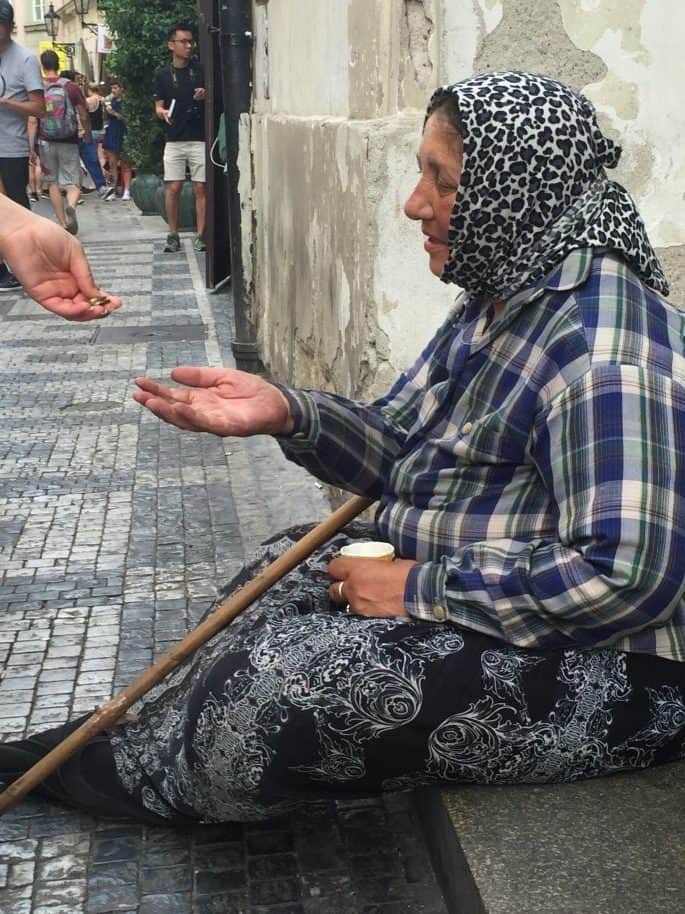9 Tips on the Art of Giving

by Umm Hana
The Etiquette of Giving
Once we overcome our hesitation in giving and open our wallets, we find ourselves at the next hurdle. In ten ayahs of Surah Baqarah below, Allah Almighty details the pitfalls of giving. We may think we are earning multiple rewards that Allah Almighty has promised for giving, but the biggest threat to us comes through our nafs and shaytan sabotaging our efforts.
The conditions that make our charitable deeds collapse, that cause our potentially brilliant investments and soaring profits to plunge on the akhirah stock exchange with resounding crashes, are explored in precise detail.
What can go wrong?
1. Expiry date
Before you give make sure you have checked your intention. Once your deed is done, you can’t go back and rectify your intention. If you are in state of constant remembrance of Allah Almighty, there will be more chance that your good deed is accepted.
At the moment that we open our wallets, we need to check if we are giving in a spirit of humility or if feelings of smug satisfaction, arrogance and self-importance have crept in.
2. Beware of boasting
Do we become so puffed up after our charitable act or donation that we cannot help but tell everyone about it? Facebook becomes our nemesis, our intention in giving for the sake of Allah Almighty, has veered off course and become murky, corrupted by our ego’s desire to be admired. There is no room for our ego when we give. Humility is the key.
3. Beware of insulting
Be graceful in our giving. If we give to someone and then keep reminding them of it, on the one hand we have helped them but on the other we hurt or embarrass them. It doesn’t take a genius to work out that we have just cancelled the positive by the negative. We should give without expecting return from the people we give to. Our reward is from Allah Almighty.
4. Give in secret
While it is permissible to give publicly, especially we are encouraging others to give, giving in secret ensures that we are giving purely for the sake of Allah Almighty and it is this type of giving that Allah Almighty singles out for special reward, offering these givers shade under His Throne on the Day of Judgement. So secret is their giving, that their left hand isn’t even aware of their right hand’s donation. (Obviously it has to be yours before you give- if you want to give charity from someone else’s wealth, you need to seek their permission first!)
5. Give what is good
If you’re going to give away something, don’t delude yourself that it is charity if you are giving away something you didn’t want in the first place, or that was broken or expired. Give from the things you love and value, things that are good and wholesome, the things that you would love to receive or use yourself. Allah only accepts the tayyab.
Similarly if you are giving qurbani then it should be from a healthy animal, not one that was ill or dying.
6. Remember you are giving from Allah’s bounty
Appreciate the fact that Allah Almighty has bestowed favours on you and enabled you to give. ‘The upper hand is better than the lower hand.’ It is so much better to be in a position to give than to receive. When you realise that the wealth was never yours to keep but yours to share, you change your perspective and can become more open and generous.
Give, secure in the knowledge that you are giving to Allah and that he is keeping account of every tiny atom that you have given.
Allah Almighty says that He does not need our wealth, He is ghani, but whatever we give, it is as if we give it into Allah Almighty’s hands, and then it passes on to the recipient. For this reason, Aisha r.a would perfume money before she gave it in charity. We can learn from her example and if we are conscious that the recipient of our donation is Allah Almighty Himself, we would think twice before we passed on something that wasn’t up to scratch.
7. Train yourself to give
Just as you exercise to strengthen and tone your body, to soften any tendency of stinginess within us, we can train ourselves to give. Bukhl (miserliness) is a disease of the heart. We can root it out by giving frequently, even if it is small amounts.
8. Be balanced
Don’t give beyond your means. Make sure you do not neglect the rights of your family. When the zakat collectors were collecting zakat they were instructed to take from the average of people’s crops, not their top quality unless it was offered to them. We do not need to be overly extravagant when we give.
9. You are what you give
Remember what you give is reflection of you. To put it bluntly: Are you cheap? Or are you a person of quality? It is irrelevant what you receive from others, you are not accountable for their giving, but you are accountable for yours. Realise your potential and live up to your own expectations of yourself.
The ayahs of giving from Surah Baqarah:
Those who spend their wealth in the Cause of Allah, and do not follow up their gifts with reminders of their generosity or with injury, their reward is with their Lord. On them shall be no fear, nor shall they grieve (2:262)
Kind words and forgiving of faults are better than Sadaqah (charity) followed by injury. And Allah is Rich (Free of all Needs) and He is Most-Forbearing. (2:263)
O you who believe! Do not render in vain your Sadaqah (charity) by reminders of your generosity or by injury, like him who spends his wealth to be seen of men, and he does not believe in Allah, nor in the Last Day. His likeness is the likeness of a smooth rock on which is a little dust; on it falls heavy rain which leaves it bare. They are not able to do anything with what they have earned. And Allah does not guide the disbelieving people. (2:264)
And the likeness of those who spend their wealth seeking Allah’s Pleasure while they in their own selves are sure and certain that Allah will reward them (for their spending in His Cause), is the likeness of a garden on a height; heavy rain falls on it and it doubles its yield of harvest. And if it does not receive heavy rain, light rain suffices it. And Allah is All-Seer of (knows well) what you do. (2:265)
Would any of you wish to have a garden with date-palms and vines, with rivers flowing underneath, and all kinds of fruits for him therein, while he is stricken with old age, and his children are weak (not able to look after themselves), then it is struck with a fiery whirlwind, so that it is burnt? Thus does Allah make clear His Ayat (proofs, evidences, verses) to you that you may give thought. (2:266)
O you who believe! Spend of the good things which you have (legally) earned, and of that which We have produced from the earth for you, and do not aim at that which is bad to spend from it, (though) you would not accept it save if you close your eyes and tolerate therein. And know that Allah is Rich (Free of all wants), and Worthy of all praise. (2:267)
Shaitan (Satan) threatens you with poverty and orders you to commit Fahsha (evil deeds, illegal sexual intercourse, sins); whereas Allah promises you Forgiveness from Himself and Bounty, and Allah is All-Sufficient for His creatures’ needs, All-Knower. (2:268)
He grants Hikmah to whom He pleases, and he, to whom Hikmah is granted, is indeed granted abundant good. But none remember (will receive admonition) except men of understanding. (2:269)
And whatever you spend for spendings (e.g., in Sadaqah – charity, for Allah’s Cause) or whatever vow you make, be sure Allah knows it all. And for the Zalimun (wrong-doers) there are no helpers. (2:270)
If you disclose your Sadaqat (alms-giving), it is well, but if you conceal them, and give them to the poor, that is better for you. (Allah) will expiate you some of your sins. And Allah is Well-Acquainted with what you do. (2:271)
Not upon you (Muhammad) is their guidance, but Allah guides whom He wills. And whatever you spend in good, it is for yourselves, when you spend not except seeking Allah’s Countenance. And whatever you spend in good, it will be repaid to you in full, and you shall not be wronged. (2:272)
(Charity is) for Fuqara (the poor), who in Allah’s Cause are restricted (from travel), and cannot move about in the land (for trade or work). The one who knows them not, thinks that they are rich because of their modesty. You may know them by their mark, they do not beg of people at all. And whatever you spend in good, surely Allah knows it well.




